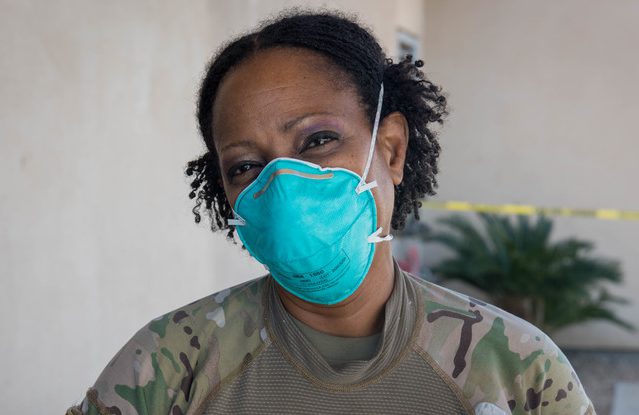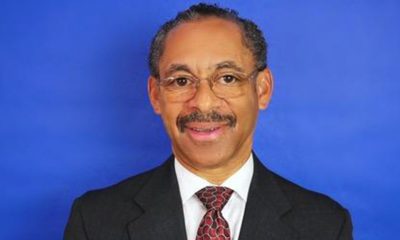Commentary
COVID-19 and Black People

It is often stated in the Black community: “when the country gets a cold, we get pneumonia.”
The genesis of this saying is unclear, but the inference is not, nor is it inaccurate. Black people suffer more from adverse medical conditions, with poorer outcomes. COVID-19, the disease process caused by infection from the pandemic virus SARS-CoV-2 will likely demonstrate its accuracy. We also hare starting from behind being poorer and with less access to basic resources. Pneumonia is more likely than just a cold.
At present, the CDC has noted that those with chronic lung disease, moderate to severe asthma, serious heart conditions, those immunocompromised including cancer treatment, severely obese, diabetic, with renal failure, or liver disease are at higher risk for severe illness. That warning should be clearly heard by the African American community. We are 2.2 times more likely to have diabetes, 20% more likely to have high blood pressure, and 30% more likely to be obese. The incidence of COPD (lung disease) in our women is 34% higher than in white women. Bottom line, if we acquire the virus, bad things are more likely to happen. That’s pass number one.
Let us layer onto that more baggage. It is now known that the social determinants of health (SDoH) play as important a role in a person’s health as genetics or medical treatment. There are, broadly, six SDoH categories: economic stability, physical environment, education, food community and social content and health care systems. Blacks are adversely affected in this arena. For example, with poorer housing we cannot generally socially isolate at home each in a different wing of the house; we may have 6 people in a 2-bedroom apartment. Searching for healthy food or using the bus to get to work (if you have a job and going to work), puts one at higher risk of acquiring the infection. Add the health risk factors above and we see a potential recipe for disaster.
I will separate one out the above-noted SDoHs: economic stability, (or lack thereof). Quoting from a Brookings Institute study, “at $171,000, the net worth of a typical white family is nearly ten times greater than that of a Black family in 2016. Gaps in wealth between Black and White households reveal the effects of accumulated inequality and discrimination, as well as differences in power and opportunity that can be traced back to this nation’s inception. The Black-White wealth gap reflects a society that has not and does not afford equality of opportunity to all its citizens.” Allow an addendum; The Black-White HEALTH gap reflects a society that has not and does not afford equality of opportunity to all its citizens.
So how will we know if this is borne out in the COVID-19 pandemic? Only by data, and this we do not have, nor a plan for to get it. Democratic lawmakers noted an apparent lack of racial data that they say is needed to monitor and address disparities in the national response to the coronavirus outbreak. In a letter to Health and Human Services Secretary Alex Azar, two lawmakers said comprehensive demographic data on people who are tested or treated for the virus that causes COVID-19 does not exist. U.S. cities with large black and brown populations such as Chicago, Detroit, Milwaukee and New Orleans have emerged as hot spots of the coronavirus outbreak. “This lack of information will exacerbate existing health disparities and result in the loss of lives in vulnerable communities,” the letter warned.
So here we are. Blacks are at higher risk of complications from CPOVID-19. Blacks are theoretically more prone to acquire COVID-19, and if we are disproportionately affected we don’t even know. Where does all of this leave us? With pneumonia.
Activism
Oakland Post: Week of April 30 – May 6, 2025
The printed Weekly Edition of the Oakland Post: Week of April 30 – May 6, 2025

To enlarge your view of this issue, use the slider, magnifying glass icon or full page icon in the lower right corner of the browser window.
Arts and Culture
BOOK REVIEW: Love, Rita: An American Story of Sisterhood, Joy, Loss, and Legacy
When Bridgett M. Davis was in college, her sister Rita was diagnosed with lupus, a disease of the immune system that often left her constantly tired and sore. Davis was a bit unfazed, but sympathetic to Rita’s suffering and also annoyed that the disease sometimes came between them. By that time, they needed one another more than ever.

By Terri Schlichenmeyer
Author: Bridgett M. Davis, c.2025, Harper, $29.99, 367 Pages
Take care.
Do it because you want to stay well, upright, and away from illness. Eat right, swallow your vitamins and hydrate, keep good habits and hygiene, and cross your fingers. Take care as much as you can because, as in the new book, “Love, Rita” by Bridgett M. Davis, your well-being is sometimes out of your hands.
It was a family story told often: when Davis was born, her sister, Rita, then four years old, stormed up to her crying newborn sibling and said, ‘Shut your … mouth!’
Rita, says Davis, didn’t want a little sister then. She already had two big sisters and a neighbor who was somewhat of a “sister,” and this baby was an irritation. As Davis grew, the feeling was mutual, although she always knew that Rita loved her.
Over the years, the sisters tried many times not to fight — on their own and at the urging of their mother — and though division was ever present, it eased when Rita went to college. Davis was still in high school then, and she admired her big sister.
She eagerly devoured frequent letters sent to her in the mail, signed, “Love, Rita.”
When Davis was in college herself, Rita was diagnosed with lupus, a disease of the immune system that often left her constantly tired and sore. Davis was a bit unfazed, but sympathetic to Rita’s suffering and also annoyed that the disease sometimes came between them. By that time, they needed one another more than ever.
First, they lost their father. Drugs then invaded the family and addiction stole two siblings. A sister and a young nephew were murdered in a domestic violence incident. Their mother was devastated; Rita’s lupus was an “added weight of her sorrow.”
After their mother died of colon cancer, Rita’s lupus took a turn for the worse.
“Did she even stand a chance?” Davis wrote in her journal.
“It just didn’t seem possible that she, someone so full of life, could die.”
Let’s start here: once you get past the prologue in “Love, Rita,” you may lose interest. Maybe.
Most of the stories that author Bridgett M. Davis shares are mildly interesting, nothing rare, mostly commonplace tales of growing up in the 1960s and ’70s with a sibling. There are a lot of these kinds of stories, and they tend to generally melt together. After about fifty pages of them, you might start to think about putting the book aside.
But don’t. Not quite yet.
In between those everyday tales, Davis occasionally writes about being an ailing Black woman in America, the incorrect assumptions made by doctors, the history of medical treatment for Black people (women in particular), attitudes, and mythologies. Those passages are now and then, interspersed, but worth scanning for.
This book is perhaps best for anyone with the patience for a slow-paced memoir, or anyone who loves a Black woman who’s ill or might be ill someday. If that’s you and you can read between the lines, then “Love, Rita” is a book to take in carefully.
Activism
Faces Around the Bay: Author Karen Lewis Took the ‘Detour to Straight Street’
“My life has been a roller-coaster with an unlimited ride wristband! I was raised in Berkeley during the time of Ron Dellums, the Black Panthers, and People’s Park. I was a Hippie kid, my Auntie cut off all our hair so we could wear the natural styles like her and Angela Davis.

By Barbara Fluhrer
I met Karen Lewis on a park bench in Berkeley. She wrote her story on the spot.
“My life has been a roller-coaster with an unlimited ride wristband! I was raised in Berkeley during the time of Ron Dellums, the Black Panthers, and People’s Park. I was a Hippie kid, my Auntie cut off all our hair so we could wear the natural styles like her and Angela Davis.
I got married young, then ended up getting divorced, raising two boys into men. After my divorce, I had a stroke that left me blind and paralyzed. I was homeless, lost in a fog with blurred vision.
Jesus healed me! I now have two beautiful grandkids. At 61, this age and this stage, I am finally free indeed. Our Lord Jesus Christ saved my soul. I now know how to be still. I lay at his feet. I surrender and just rest. My life and every step on my path have already been ordered. So, I have learned in this life…it’s nice to be nice. No stressing, just blessings. Pray for the best and deal with the rest.
Nobody is perfect, so forgive quickly and love easily!”
Lewis’ book “Detour to Straight Street” is available on Amazon.
-

 Activism3 weeks ago
Activism3 weeks agoOakland Post: Week of April 9 – 15, 2025
-

 Activism3 weeks ago
Activism3 weeks agoOakland Post: Week of April 16 – 22, 2025
-

 #NNPA BlackPress4 weeks ago
#NNPA BlackPress4 weeks agoTrump Profits, Black America Pays the Price
-

 Activism1 week ago
Activism1 week agoAI Is Reshaping Black Healthcare: Promise, Peril, and the Push for Improved Results in California
-

 Activism1 week ago
Activism1 week agoBarbara Lee Accepts Victory With “Responsibility, Humility and Love”
-

 Activism1 week ago
Activism1 week agoNewsom Fights Back as AmeriCorps Shutdown Threatens Vital Services in Black Communities
-

 #NNPA BlackPress4 weeks ago
#NNPA BlackPress4 weeks agoHarriet Tubman Scrubbed; DEI Dismantled
-

 #NNPA BlackPress4 weeks ago
#NNPA BlackPress4 weeks agoNew York Stands Firm Against Trump Administration’s Order to Abandon Diversity in Schools


![Zccording to Dr. Oliver Brooks, Chief Medical Officer, Watts Healthcare, “unvaccinated people [account for] 2.4 times more cases, 4.6 times more hospitalizations, 8 times more deaths.”](https://www.postnewsgroup.com/wp-content/uploads/2022/09/bivalent-boosters-featured-web-400x240.jpg)
![Zccording to Dr. Oliver Brooks, Chief Medical Officer, Watts Healthcare, “unvaccinated people [account for] 2.4 times more cases, 4.6 times more hospitalizations, 8 times more deaths.”](https://www.postnewsgroup.com/wp-content/uploads/2022/09/bivalent-boosters-featured-web-80x80.jpg)

















































1 Comment